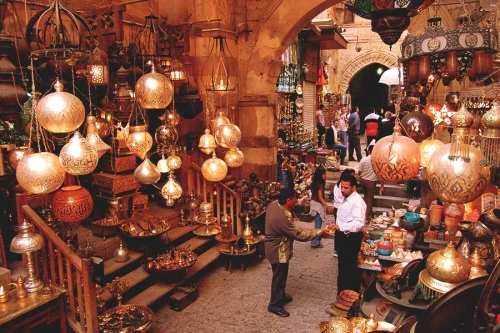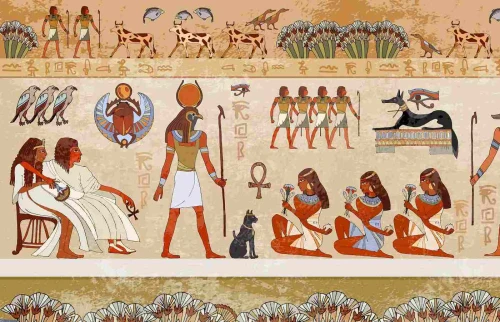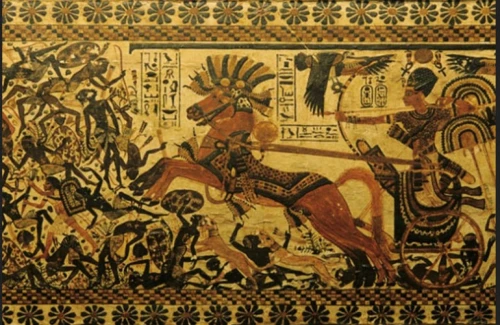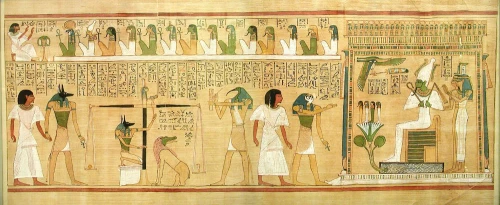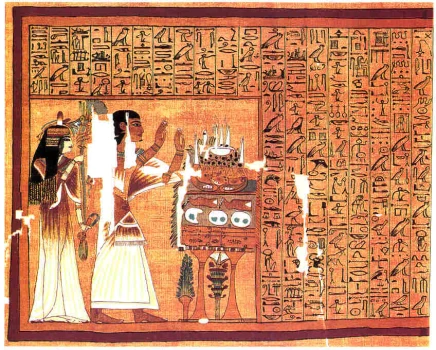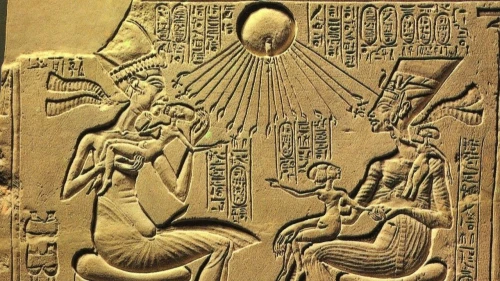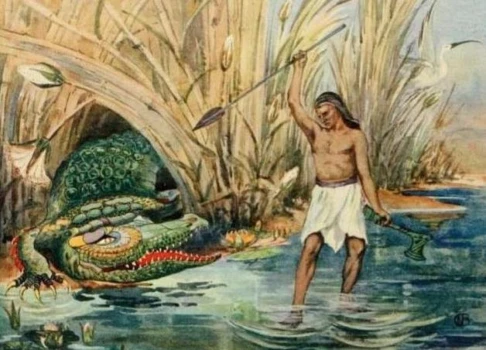
DOOMED PRINCE, MYTH OF THE The story of the doomed prince is found in the Harris Papyrus, written in the Eighteenth Dynasty (1550 - 1295 B.C) and now in the British Museum. The papyrus tells the story of a prince of Egypt and his destiny, but, unfortunately, the papyrus is damaged and the end of the story is missing.
The story goes as follows: Once there was a king who longed for a son and prayed fervently to the gods to grant his wish. The gods answered his prayers and a son was born to his wife. Hathor was summoned to decide the young prince's destiny and pronounced: His death shall be by the crocodile, or by the serpent, or by the dog. Upon hearing the destiny of his son, the king was greatly troubled. To keep the prince safe from harm, he built a palace in the mountains and furnished it with everything that could be desired so that his son would never wish to leave. One day the young prince climbed to the roof of his palace and, looking down, he saw a man walking along the road with a dog. The prince asked his companion, What is that following the man on the road? That is a dog, answered the companion, and the prince said, Let there be brought to me one like it. When the king was told of the prince's request, he could not deny his son's wish and sent a little dog to the prince. As the prince grew into manhood, he wanted to leave his palace. He sent a message to his father saying he wished to be free to go his own way: Though I am fated to three evil fates, let me follow my desires.
52 DJEHUTY
The Djed pillar represents the backbone of Osiris, the god of the dead. Djed amulets represented stability. (Photo by Pat Remler)
Let the gods fulfill their will.” The king, who could not deny his son, agreed, and the prince, armed with weapons of many kinds, set out with his dog. First, he went north to the desert and lived by hunting game.
Then he went to the chief of Naharaina, whose only child was a daughter. The chief had built a great house for her with 70 windows, every 70 cubits from the ground. He then summoned the sons of the chiefs of Khalu, saying, He who climbs and reaches my daughter's window shall win her for his wife. When the prince met the sons of the chiefs of Khalu, he was treated with great kindness. They asked the prince where he had come from, and he answered that he came from Egypt: I am the son of an officer of the land. My mother died and my father has taken another wife, who, when she bore my father other children, grew to hate me. Therefore I have fled. They felt sorry for him and embraced him and told the prince they had come to climb to the windows of the chief's daughter's house. The prince had seen the princess from afar when she stood at her window gazing out, and he was inspired to climb the high wall. When he reached the princess, she kissed him and embraced him, and sent a message to her father that a suitor has reached her window.
The chief was pleased until he heard it was the fugitive from Egypt who had reached his daughter. He became angry and ordered that the prince return to Egypt. The messenger rushed to warn the prince, but the chief's daughter refused to let her suitor go, saying, if he is taken from me, I will neither eat nor drink and in that hour I shall die! Upon hearing of her vow, the chief sent someone to murder the prince. The princess responded, By the great god Re, if he is slain, then I shall die ere the set of sun. If I am parted from him, then I will live no longer.
When the chief heard his daughter's words, he relented. He gave his daughter and the prince a fine house with servants and land and cattle and many fine gifts. After some days, the prince confided in his wife that he was doomed to three fates: a crocodile, a serpent, and a dog. She became afraid and wanted to have his dog killed, but he refused, having had the dog since he was a child. Eventually, the time came when the prince wished to travel to Egypt, and his wife, fearing for his safety, went with him. During their travels, they came to a town with a crocodile living in the river, but in that town was a strong and mighty man who captured the crocodile and bound it. When the crocodile was bound, the mighty man was at peace and walked abroad.
As the time passed, the prince and his wife were content, and as night fell, the prince slept easily. When her husband was sleeping, his wife poured milk into a bowl and placed it next to him. As she sat waiting, a serpent slipped from its hole and moved toward the prince as if to kill him. The servants of the house quickly poured milk for the serpent and it drank and became drunk and rolled on its back. Drawing her dagger, the wife stabbed the serpent many times, killing it. Awakened by the noise, the prince was astonished to see his wife with a dagger. She said to him, Behold, thy God hath given one of thy dooms into thy hand. Surely he shall also give thee the others.
The prince sacrificed to the gods of Egypt and praised them. One day when the prince was walking through his fields, his dog ran away, chasing the wild game. The prince, following his dog, plunged into the river, and the crocodile appeared and carried the prince to a place where the mighty man lived. And the crocodile said to the prince, Behold, I am thy destiny, following after thee. It is here that the papyrus breaks off; we do not know the fate of the doomed prince.
 English
English
 Spain
Spain


